Federal 209a Primer Overview
Federal 209a Primer are a type of primer used in shotshell reloading. They are designed specifically for shotgun shells and are known for their reliability and consistent performance.
Primers play a crucial role in the ignition process of a shotgun shell. When the firing pin strikes the primer, it creates a spark that ignites the propellant inside the shell, causing the powder to burn and propel the shot or slug out of the barrel.
Federal Primers 209A are considered to be a reliable choice for shotgun reloading. They are manufactured by Federal Premium Ammunition, which is a well-known and reputable brand in the firearms industry. These primers are designed to deliver consistent ignition, which is essential for achieving reliable and accurate shotshell performance.
The “209” in the primer designation refers to the industry-standard size for shotgun primers. It indicates that the primer is designed to fit into shotgun shells with 209 primer pockets. The “A” in the designation usually signifies a specific type or variant of the primer. In the case of Federal 209a Primers, it represents a specific primer formulation or design used by Federal Premium.
It’s worth noting that reloading shotgun shells requires specialized knowledge, equipment, and adherence to safety guidelines. If you are new to reloading or have limited experience, it is recommended to seek proper instruction and guidance from experienced reloaders or take a reloading course before attempting to reload shotgun shells.
Always follow safe reloading practices, including using appropriate load data, inspecting components for defects, and wearing proper safety equipment.
Here are some additional details about Federal 209a Primer and their use in shotshell reloading:
1. Reliability and Consistency: Federal 209a Primers are known for their reliability and consistent performance. They are manufactured with strict quality control measures to ensure uniformity in ignition and ignition time. This consistency is important for achieving predictable shotshell performance and accuracy.
2. Hot and Consistent Ignition: The Federal 209a primers are designed to deliver a hot and consistent ignition. This is especially important for shotgun shells containing slow-burning powders or when using heavier shot charges. The hot ignition helps ensure proper and complete ignition of the powder charge, resulting in consistent velocities and patterns.
3. Use in Different Shotshell Loads: Federal 209a Primers can be used in a variety of shotshell loads, including target loads, hunting loads, and even magnum loads. However, it is essential to consult reliable reloading manuals or trusted load data sources to determine the appropriate primer and powder charge for specific load combinations.
4. Compatibility: Federal 209a Primers are designed to fit shotgun shells with 209 primer pockets. The 209 primer pocket is the most common type found in modern shotgun shells. However, it’s important to note that different shotgun shell manufacturers may have variations in primer pocket dimensions, so always verify the compatibility of your primers with the specific shells you are reloading.
5. Safety Considerations: Reloading shotgun shells, like any reloading activity, requires strict adherence to safety guidelines. It is crucial to follow proper reloading practices, including using appropriate load data, inspecting components for defects, and following safe handling procedures. It is also recommended to use a reliable reloading manual or trusted load data sources for reference and guidance.
Remember, reloading ammunition carries inherent risks, and it is important to approach it with caution and knowledge. If you are new to reloading or have limited experience, it is recommended to seek training or guidance from experienced reloaders or take a reloading course to ensure safety and proper understanding of the process.
When using Federal 209a Primers or any primers for shotshell reloading, it is important to follow specific precautions to ensure safety and optimal performance.
Some Precautions To Consider about Federal 209a Primer:
1. Store and Handle Primers Safely: Primers are sensitive components and should be stored and handled with care. Keep primers in their original packaging or in appropriate containers designed for primer storage. Store them in a cool, dry place away from heat, flame, or other potential sources of ignition. Avoid dropping or mishandling primers, as this can cause damage or accidental discharge.
2. Inspect Primers for Defects: Before using any primers, inspect them for defects such as dents, deformities, or signs of damage. Discard any primers that appear damaged, as they may pose a safety risk during reloading or firing.
3. Use Recommended Load Data: When reloading shotshells, always refer to reliable reloading manuals or trusted load data sources for recommended powder charges and primer specifications. Using incorrect load data can lead to unsafe pressures or unreliable performance. Verify that the load data you are using is appropriate for the specific primer type, shotgun shell, powder, and components you are working with.
4. Follow Safe Reloading Practices: Adhere to safe reloading practices, including wearing appropriate safety equipment such as safety glasses and hearing protection. Maintain a clean and organized reloading area, free from clutter and distractions. Follow step-by-step reloading procedures meticulously, paying close attention to powder charges, seating depths, and overall quality control.
5. Start with Conservative Loads: If you are new to reloading or using Federal Primers 209A for the first time, it is prudent to start with conservative loads. Gradually work up to higher powder charges while monitoring for signs of excessive pressure or other issues. This cautious approach allows you to ensure the safety and reliability of your reloads.
6. Seek Professional Guidance if Needed: If you have any doubts or questions about shotshell reloading, especially when using specific primers, consider seeking guidance from experienced reloaders, attending reloading courses or workshops, or consulting with professionals in the field. They can provide valuable insights, tips, and guidance to enhance your reloading knowledge and skills.

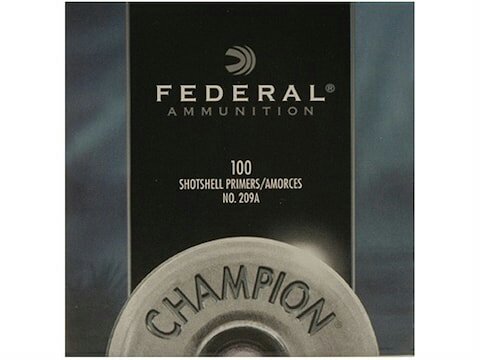

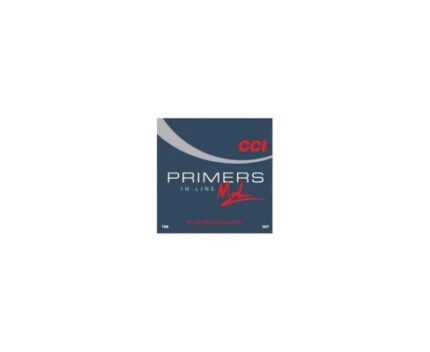


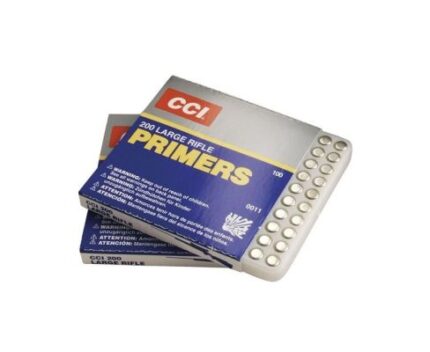
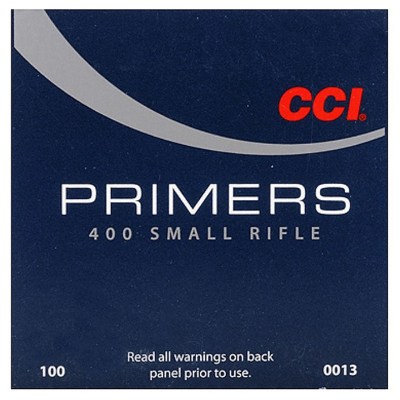

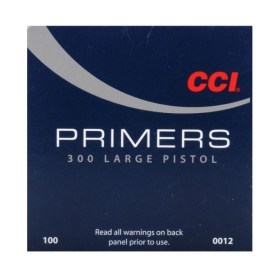
Reviews
There are no reviews yet.